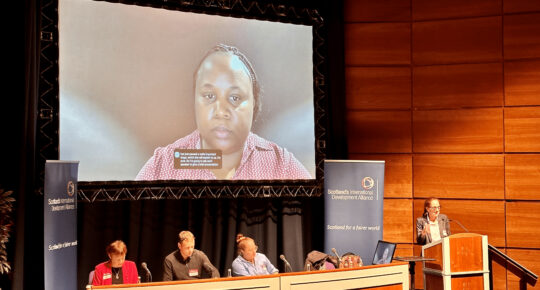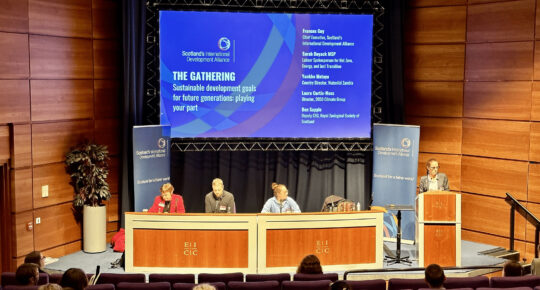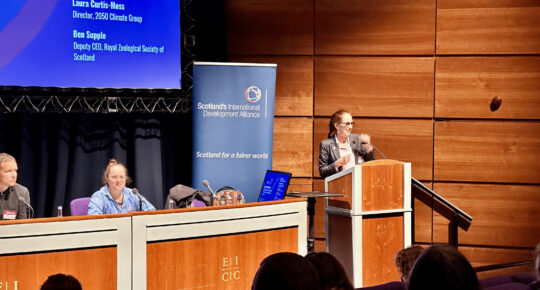The Sustainable Development Goals are for everyone everywhere, so what is the third sector in Scotland doing to help progress them? Should we be doing more, and if so how? This was the topic of our session at this year’s SCVO Gathering.
SIDA Chief Executive Frances Guy opened the meeting by asking how many people in the 50 strong room were currently working on the SDG’s in some way. Just 5 people raised their hands, so it’s clear there’s work to be done. The global goals should be globally applicable, and should help guide what we’re doing in Scotland, and how that impacts the rest of the world.
SDGs supporting each other
Yankho Mataya from WaterAid talked about their focus on SDG 6 – Clean Water and Sanitation. Progress on SDG 6 supports a range of other goals such as economic development, improved health, gender quality, and climate action. Yankho emphasized the importance of partnerships (SDG 17) as the way to achieve success across the SDGs.
Laura Curtis-Moss from Climate 2050 spoke about their focus on SDG 13 – Climate Action. However, Climate 2050 also work towards SDG 4 – Quality Education, and SDG 8 – Decent Work and Economic Growth, by supporting young people, amplifying their voices, and encouraging them to adopt green careers. SDG 10 – reducing inequality, is also important for Laura as they try to reach communities and engage them in climate issues. Again, SDG 17 is vital; the only way the goals will be achieved within 7 years is for organisations to support each other.
Ben Supple from the Royal Zoological Society shared his insights on SDG 15 – Life on Land. This goal aligns with the mission of the Royal Zoological Society, which is to halt the decline of at least 50 species by 2030. To achieve this ambitious target, Ben emphasizes the importance of partnerships. The Royal Zoological Society collaborates with various organizations, such as Buglife, RSPB, Forestry Commission, and the National Parks, to protect and restore biodiversity. SDG 4 – Education is another key goal for the Royal Zoological Society, as they strive to foster stronger connections to nature for a million people by 2030. They also work across other issues with different partners, helping to tackle homelessness, loneliness, health issues, and to encourage inclusion and accessibility to nature and green spaces.

Laying down the law
Sarah Boyack MSP talked about the role of legislation in helping achieve the SDGs, discussing her recently submitted Members Bill on Wellbeing and Sustainable Development. The Bill would provide a legal definition of sustainable development, and strengthen the obligations of public authorities to act in accordance with it. The bill also seeks to promote long term planning and decision making, as well as to establish a Commissioner for Wellbeing and Sustainable Development, who would oversee and assist the implementation and evaluation of the bill’s objectives.
Laura supported the legislation and felt that the SDG framework as a whole should be how we hold politicians to account; it should effectively be their scorecard. Laura argued that the SDGs should be the standard for measuring the performance and accountability of politicians, as they reflect the global challenges and aspirations for a better future. Ben agreed on the urgency of addressing the biodiversity crisis, which threatens 1 in 9 species with extinction, but he also warned that the legislation should not impose top-down solutions on communities, but rather involve them in the decision-making process. Frances raised a question about how Scotland’s National Performance Framework (NPF), which has 11 goals, relates to the SDGs, which have 17, suggesting it might be simpler to align wholly with the globally agreed framework.

Let’s talk about the SDGs
Laura acknowledged that whilst the SDGs are embedded in Climate 2050’s work, they don’t talk about them as much as they should, and the terminology is not used intently. For Ben, there is a risk that the SDGs are seen as top level, informing organisational strategies but not commonplace language for most of us. Sarah felt that the long term vs short term framing was most useful in getting buy in for the SDGs. When people realise they’re about considering generations they become interested. The goals are not about ticking boxes, but need to be approached as a whole, and when used together they can be transformative. Ben felt that organisations should be obliged to hit some if not all of the SDGs. Laura agreed, noting that the SDGs were interconnected and interdependent, and like Pringles: ‘once you pop, you can’t stop!’.

